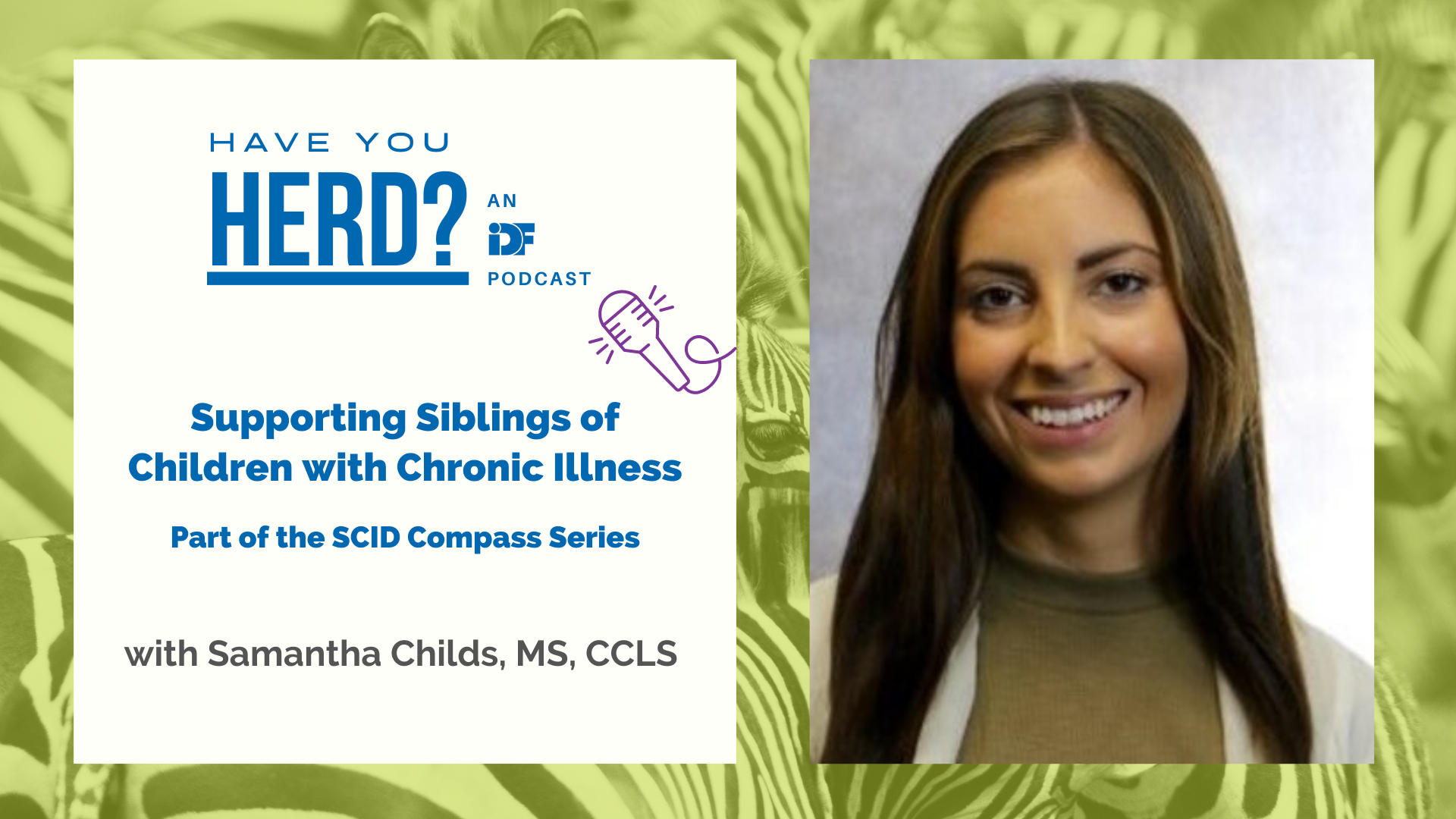
-
Understanding primary immunodeficiency (PI)

Understanding PI
The more you understand about primary immunodeficiency (PI), the better you can live with the disease or support others in your life with PI. Learn more about PI, including the various diagnoses and treatment options.
-
Living with PI
-
Addressing mental health
-
Explaining your diagnosis
- General care
- Get support
- For parents and guardians
-
Managing workplace issues
- Navigating insurance
-
Traveling safely

Living with PI
Living with primary immunodeficiency (PI) can be challenging, but you’re not alone—many people with PI lead full and active lives. With the right support and resources, you can, too.
-
Addressing mental health
-
Get involved

Get involved
Be a hero for those with PI. Change lives by promoting primary immunodeficiency (PI) awareness and taking action in your community through advocacy, donating, volunteering, or fundraising.
-
Advancing research and clinical care
-
Research Grant Program
-
Consulting immunologist
-
Diagnosing PI
-
Getting prior authorization
-
Clinician education
-
Survey research
-
Participating in clinical trials

Advancing research and clinical care
Whether you’re a clinician, researcher, or an individual with primary immunodeficiency (PI), IDF has resources to help you advance the field. Get details on surveys, grants, and clinical trials.
-
Research Grant Program
A diagnosis of severe combined immunodeficiency (SCID) is overwhelming, not only for parents but also for the siblings of the baby diagnosed. As parents immerse themselves in navigating a life-threatening medical emergency for their baby, siblings’ needs go unmet, their routines are interrupted, and they experience anxiety, said Samantha Childs, during her recent SCID Compass Lunch & Learn presentation, “Supporting Siblings of Children with Chronic Illness.”

“It’s not something that only the patient or the parents are feeling, it’s something that a sibling is feeling and experiencing in a very real way, no more or less than the patient or the parents,” said Childs, a child-life specialist who runs Kids Cope Baltimore, a clinic that specializes in helping children process grief, loss, and trauma.
“It’s important that caregivers manage the stress and responsibility of caring for their sick child while supporting the emotional well-being of their siblings and other children in the family. It’s a very difficult task.”
During her presentation, Childs explained the siblings’ point of view as it relates to a SCID diagnosis, offered strategies for parents to support their children during every developmental stage, and outlined basic tenants for parenting siblings of a child with chronic illness.
While parents meet with doctors and focus on treatment and post-treatment for their baby at the hospital, the siblings back home receive information from their parents or other caregivers that may not paint the full picture of what is happening.
“Their imagination runs wild. They are trying to fill in the gaps of what they know and what they don’t really understand and often that’s scarier than reality,” said Childs. “There’s a very black and white difference between the experience of the caregivers and the experience of the siblings. That can set up the trajectory of how the siblings cope into the future.”
When the baby comes home, the transition heavily impacts siblings. Routines shift and more responsibility is placed on children. Parents act more protective of the new baby and may limit contact with siblings. They focus on taking the baby to appointments and speaking with providers on the phone. These changes provoke anxiety and confusion in siblings.
“It’s isolating, frustrating, and scary,” said Childs. “This is where the coping mechanisms are starting to form, and they can either adjust in a positive way or a more negative way, so it’s really important that the support intervention start as soon as possible.”
Different developmental stages present different challenges and require age-appropriate responses.
Toddlers and preschoolers experience separation anxiety, regress in walking or talking, and throw tantrums in response to the changes brought on by a SCID diagnosis. Parents should address these age groups with easy-to-understand explanations (the baby is going to the doctor to feel better) repeated often. Assure older children ages 3 to 6 that it’s not their fault the baby is sick, encourage questions to clear up misconceptions, and incorporate dialogue about the topic into play.
School-age children feel worried for their baby brother or sister but may also be jealous of the attention the baby receives. They withdraw from school, friends, and activities, and become clingy and uncooperative sometimes. Offer comfort to the child by validating their feelings, even if they express that they dislike the baby. Encourage questions and offer concrete details about the baby’s illness, providing information based on the child’s comfort level.
“You’ll know what works best for your child and you can include them in conversations or not,” said Childs.
Teens face increased caregiving demands as they assist with younger siblings and at the same time lose important social time with friends. They feel angry and frustrated. Parents should encourage time with peers and bring teens into the conversations about the baby’s health.
“Respect independence,” said Childs. “It’s important that the teen knows that you are your own person and are allowed to function independently as much as possible and that they are a sibling first and a caregiver second.”
Parents should concentrate on supporting their children in these four key areas:
Knowledge – Help siblings understand changes in routines (such as schedules and expectations), loop them into medical discussions when appropriate, answer questions, and avoid protecting siblings from potentially scary or uncomfortable information.
Communication – Schedule time to talk to siblings about the baby’s diagnosis and treatment, and if a parent is in the hospital, reach out to siblings daily through phone or video calls. Parents should feel comfortable sharing their own emotions like sadness or anger.
Connection – Stay connected with siblings through photos, cards, notes, and videos. Spend one-on-one time with a sibling, encourage a sibling to accompany the baby on appointments (if appropriate), and allow time for friends.
Consistency – Promote routines in bedtime, mealtimes, school, extracurricular activities, and family rules, remaining patient as siblings adapt.
Childs said that children can benefit from the experience of having a younger sibling diagnosed with chronic illness. They develop empathy, compassion, and thoughtfulness, become more mature and independent, and learn responsibility.
“If siblings feel empowered, supported, and autonomous, they have a greater chance of developing positive feelings towards their siblings, being well-adjusted, and experiencing positive outcomes,” said Childs.
Related resources
Sign up for updates from IDF
Receive news and helpful resources to your cell phone or inbox. You can change or cancel your subscription at any time.





The Immune Deficiency Foundation improves the diagnosis, treatment, and quality of life for every person affected by primary immunodeficiency.
We foster a community that is connected, engaged, and empowered through advocacy, education, and research.
Combined Charity Campaign | CFC# 66309




